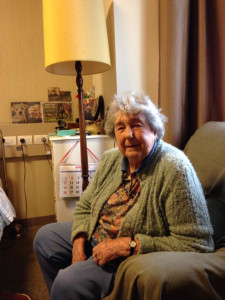Audrey, A Woman in the War
Nostalgia, War Stories | April 27, 2015By Jake Watson
It is an unfortunate fact that people often overlook the great efforts of women during war times. During the Second World War, women served in many crucial roles, including overseas roles, such as in New Guinea and Singapore, as nurses, anti-aircraft gunners, mechanics, and radio operators. Not only this, but as in the case of Audrey Martin, in the Signals Corps.

Photograph taken by Jake Watson
Ms Martin, born in the early 1920s in Berrigan, in the Riverina region of New South Wales, was the youngest of seven children. She is now the only one left.
Her life has been a very long one, she says, and she has a little trouble picking out particular memories of it, though years that still loom large in her mind are the years in which she served. She is fondest of her Army years, and she entered into them with remarkably little fuss.
“The war came,” she says. “And I decided I was going to be in it. So, I joined the Army.”
So she joined the Signals Corps, doing work she found interesting and which she enjoyed. During her five years in the military, she rose to the rank of Lieutenant, and was married, though they did not have kids. They were careful during the war days, such uncertain times, not to enter into such a contract. Not to mention some stern advice from her mother. “You’d better not start having a family,” Audrey was told. “It’d be a bit difficult.”
The events of such a long life have become a little jumbled for her, and some specific years and dates have avoided her recollection, though at some point after the war she left the Signals Corps and went into the Department of Army, which since the outbreak of World War II had controlled the administration and finances the Australian Army. In this department she did various jobs, such as being a typist and a stenographer. She was in this department for about four years, before traveling abroad, to Europe.
“I did the touring around that most of us did in those days,” Ms Martin says. “I’m not sure if they still do it.” When informed that people most certainly do still do it, she smiles and nods happily, saying, “Yes, yes. I’m quite sure.”
She was overseas for four or five years, during which time her marriage got her into “a bit of strife”, as she puts it. They divorced, and Audrey Martin returned to Australia. She is not sure where her ex-husband ended up. Ms Martin never remarried, though this does not worry her. “I’m quite happy doing what I’m doing now,” she says. “And there were several other romantic interests, anyway.” When Audrey Martin speaks of the men she’s known, she speaks with the cheekiness of a teenager who is curious about them, and the strong dignity of a woman who has never needed one. (Indeed, at the end of the discussion, she winks and says, “There you go; now you can go tell the fellas that you’ve spent the morning with an older lady in her room.”)
While Ms Martin’s military years are undoubtedly her favourite, she has many other fond memories. She was a great sportswoman, and played several different sports, though cricket seems her preference. She was a fast bowler for the Victorian Women’s state team, and remembers days spent in the company of men such as Bill Woodfull and Sir Donald Bradman. Woodfull was her favourite, and she says the men were always happy and willing to help the women with their cricket.
Speaking to Audrey Martin, you cannot help but have the sense that she is a woman who has lived such a long and vivid life that particular dates, durations and details have become inconsequential to her, and that even though some of it may now be lost to her, has brought and continues to bring her a great deal of joy. Her goal now, she says, is to make it to 100; a worthy goal, you would think, for a cricketer.





